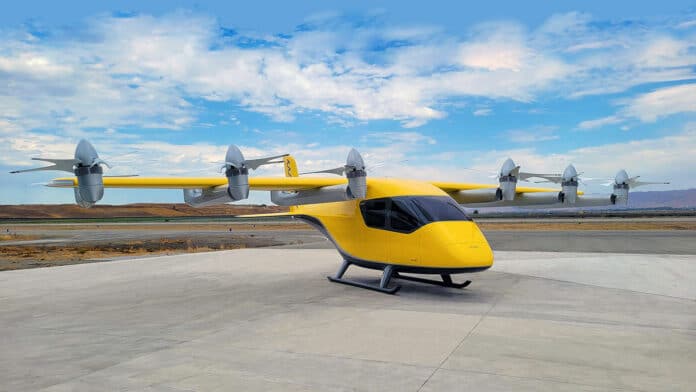An Advanced Air Mobility (AAM) company Wisk Aero has revealed the world’s first self-flying, all-electric, four-passenger vertical takeoff, and landing (eVTOL) air taxi. This is Wisk’s sixth generation of air taxis and is the first candidate for type certification by the FAA of an autonomous eVTOL.
The autonomous air taxi features a 12-prop configuration spread over the 50 ft (15-meter) wingspan for liftoff. Tilting propulsion units in front of the wing and fixed lift units aft of the wing are optimized for range, improved aircraft control and performance, and efficient energy management.
Wisk’s air taxi can reach a speed of 222 km/h (120 knots) at heights between 762 and 1,219 meters (2,500 to 4,000 feet). In addition, it has a range of almost 150 km (90 miles) with reserves.
It has a larger passenger cabin with 4 seats and ample storage for baggage and personal carry-on items. According to Wisk, the air taxi is quite safe because it has fewer moving parts and does not use hydraulics or fuel, or oil, which reduces the failure factor and the noise emitted. Wisk’s aircraft is being designed to exceed today’s rigorous aviation safety standards of a one-in-a-billion chance of an accident.
The eVTOL has been designed to fly autonomously courtesy of the combined efforts of proven technologies, logic-driven, procedural-based, decision-making software, a suite of onboard sensors, improved detect and avoid capabilities, and more. Although the air taxi is autonomous, it will operate under the watchful eyes of remote human multi-vehicle supervisors, who have the ability to intervene when needed. In addition, the vehicle will offer Wi-Fi connection for passengers and chargers for their devices.
Wisk has an alliance with aircraft manufacturer Boeing, with whom it cooperates on aircraft design, production, and certification. The company’s goal is to create an autonomous air taxi designed to be a service for everyone, with a price target of $3 per passenger, per mile.
